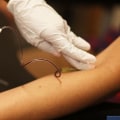Some sexually transmitted diseases (STDs) have symptoms, but many don't, so they can go unnoticed for a long time. For instance, HIV symptoms may take more than 10 years to manifest, and infections such as herpes, chlamydia, and gonorrhea can spread even if there are no signs. It all depends on the STI you have. Several of the more than 20 types of STDs can remain latent for months, years, or even decades.
Latent STDs and STIs emphasize the importance of sexual health testing, since only one test can determine if there is an asymptomatic infection. Surprisingly, gonorrhea is an STI that rarely shows symptoms or indications that it is affecting a person's body. The vast majority of cases of gonorrhea have very few or no signs. A person infected with gonorrhea can go up to six months without any evidence of infection before more serious symptoms and signs appear.
Any of the symptoms that occur in the first few weeks can easily be mistaken for another type of infection, such as vaginal infection. Because gonorrhea affects a person's skin, it's possible to get gonorrhea in the anus or in the mouth. The state of Ohio is filling the training gaps for Ohio healthcare providers with two projects designed by experts in maternal-fetal medicine and emergency medicine. If you're looking for symptoms or treatments for STIs on the Internet, you'll no doubt find home test kits along with a variety of “natural remedies for STIs” with dubious claims of success. Stroke isn't just a man's disease.
Learn about the indicators and risk factors for women. Get advice from Ohio State experts direct to your inbox. That's why regular testing for STDs is essential to your health, and for the health of others it's the only way to know for sure if you have an STD. If you suspect that you have an STD, it's always a good idea to have an STD lab test instead of waiting for other symptoms to occur. A latent sexually transmitted disease is a disease or infection that exists in the body without causing any signs of STDs.
The high degree of transmission of STIs and STDs is one of the reasons why it's so important to get tested for STDs, especially testing for STDs at home. Each STD has a different incubation period, meaning they vary in the amount of time it takes for symptoms to appear.







